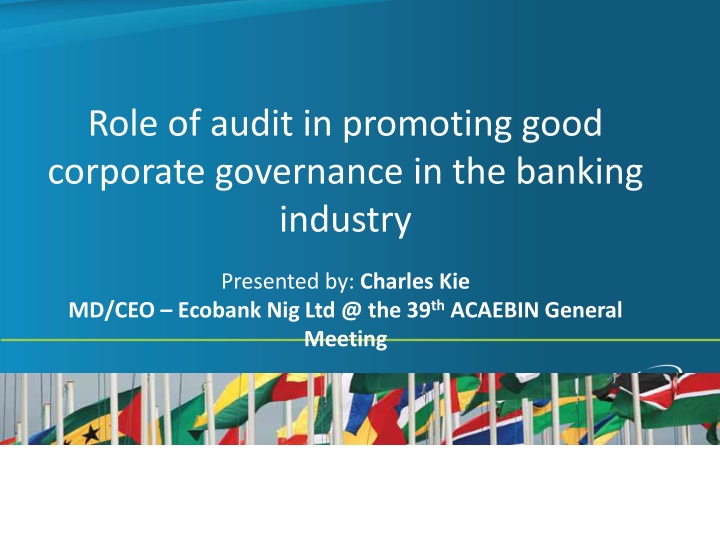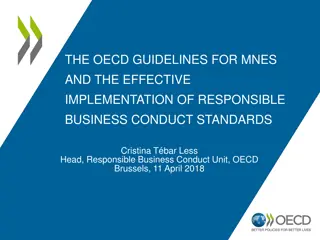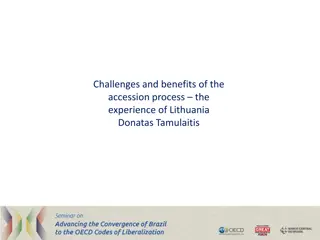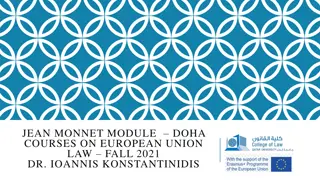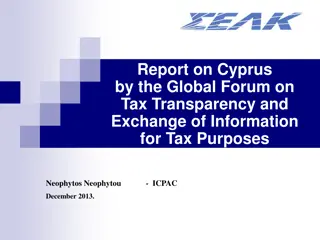OECD Accession Process Overview
The OECD accession process involves a rigorous review of legislation, policy, and practices across various committees. This in-depth examination aims to ensure alignment with OECD standards and policies, serving as a catalyst for reform in candidate countries. The process includes stages such as Initial Council Decision, Decentralised Technical Process, Council Oversight, Council Decision to Invite, and Signature of Accession Agreement. Committees involved cover areas like investment, corporate governance, financial markets, competition, fiscal affairs, environment policy, and more.
Download Presentation

Please find below an Image/Link to download the presentation.
The content on the website is provided AS IS for your information and personal use only. It may not be sold, licensed, or shared on other websites without obtaining consent from the author.If you encounter any issues during the download, it is possible that the publisher has removed the file from their server.
You are allowed to download the files provided on this website for personal or commercial use, subject to the condition that they are used lawfully. All files are the property of their respective owners.
The content on the website is provided AS IS for your information and personal use only. It may not be sold, licensed, or shared on other websites without obtaining consent from the author.
E N D
Presentation Transcript
Role of audit in promoting good corporate governance in the banking industry Presented by: Charles Kie MD/CEO Ecobank Nig Ltd @ the 39th ACAEBIN General Meeting @ the 39th ACAEBIN General Meeting June 2018
Outline Salutation Why Corporate Governance? Governance failures: Where was the auditor? Imperatives for Internal Audit Expectations from CAEs Conclusion
SALUTATION The Chairman, ACAEBIN Members of ACAEBIN Representatives of CBN, NDIC, CIBN, FITC Ladies and Gentlemen, Good Morning! I count this a privilege and honour to host the 39th Quarterly General Meeting of ACAEBIN the theme of which is The role of audit in promoting good corporate governance . This is an intelligent and professional forum through which all Chief Audit Executives exchange ideas and discuss topical issues influencing the nation s banking industry and financial services industry at large. ACAEBIN s engagements with the industry have contributed immensely to improved corporate governance, dealing with emerging issues, fight against frauds and improved communication amongst those responsible for internal controls within the industry. It has also helped to sharpen the skills of members through training, exchange of ideas and finding a common ground for contentious matters in the banking industry which enhances the Audit function in general. Having said these, while I enjoin members to continue to share ideas that will assist in addressing the foreseeable threats in digital banking and its potential disruptions; I have chosen to speak briefly on Corporate Governance in view of its significance and recent developments in the industry. Professional colleagues, I hereby congratulate ACAEBIN for initiating and sustaining this laudable quarterly forum for Chief Audit Executives and wish you successful deliberations.
Preamble Why Corporate Governance? The last two decades have been eventful in terms of changes in the Corporate Governance landscape. Abuses at the executive suites and governance failures have led to unprecedented changes in regulatory frameworks and how businesses are controlled and directed locally and globally. The corporate scandals and failures in corporate titans like Parmalat, WorldCom and Enron during 2001-2003 underscored the need for tighter controls and vigilance by regulators and companies alike. These heralded the Sarbanes-Oxley Act in 2002 in the USA which led to similar reforms in other countries. In Nigeria, the CBN/NDIC interventions in some banks in 2009 is still fresh in our minds. This is aside the spate of corporate failures in the early 1990s. The need to highlight the rights and responsibilities among different participants in a financial institution (Board of Directors, management, shareholders, creditors, auditors, regulators and other stakeholders is pertinent at this point in Nigeria s history in view of recent developments which indicate that the threat of corporate failures due to governance issues still exist in the banking industry; notwithstanding the reforms and policies put in place to mitigate this risk.
Preamble The NDIC recently said another bank failure is imminent in the country on the back of weak corporate governance culture and weak internal control. The Managing Director, NDIC, Alhaji Umaru Ibrahim, stated this on Thursday (25 May,2018) at the FITC Thought Leadership Discussion Series in Lagos where he was represented by the corporation s Executive Director, Operations, Aghatise Erediauwa. He said, Banks usually have a cycle of between seven to 10 years. If we have not had bank failure in 15 years, then they are bound to happen soon. Presently, we are worried that the cycle is almost complete.
Preamble Where was the auditor? In the case of Enron, profits were overstated by as much as $586 million for 4 years. In the case of WorldCom fraud in 2002; operating expenses of $3.8 billion were capitalized thus overstating its profit. In Nigeria, the industry is still contending with the aftermath of regulatory interventions in some banks which cost the CBN puts, at N3 trillion in 8 years. The Cadbury Nigeria Plc scandal (2006) remains a reference point for fraudulent financial reporting. Other cases of fraudulent financial reporting in Nigeria include the case of Lever Brothers Nigeria Plc (1997).
Internal Audit (IA) and Corporate Governance - imperatives As defined by the Institute of Internal Auditors Internal auditing is an independent, objective assurance and consulting activity designed to add value and improve an organization s operations. It helps an organization accomplish its objectives by bringing a systematic, disciplined approach to evaluate and improve the effectiveness of risk management, control, and governance processes .This clearly indicates that the role of the IA function has gone beyond the traditional concept of controlling and safeguarding corporate assets, regulatory compliance and enforcing corporate policies. The role of IA is rather to focus on value creation for an organization, and on evaluating and suggesting improvements to corporate governance systems of organizations. The value creation concept of IA will therefore be an integrated part of making sure that the company achieves long-term success and that it is creating value for the society at large. An effective IA function plays a fundamental role in assisting the Board to discharge its governance and control responsibilities. The Board must, however, set the right tone at the top and ensure support is extended to IA at all levels within the organization. It should be communicated and understood that IA helps the Board and the executive management in protecting the assets, reputation and sustainability of any organization.
Internal Audit (IA) and Corporate Governance - imperatives Internal auditor, with the help and guidance of the audit committee, must be able to set the right priorities. Therefore it is recommended that IA follows a risk based approach, focusing on the high risk areas, going down the ladder as much as possible. The audit committee also assists IA by discussing with them the adequacy of resources and skills available to address risks identified with the audit committee. It is the role of the board/ audit committee to make sure that IA has enough resources and calibres to do their job right, keeping in mind that the failure of IA is a failure of the board itself and may represent high risk on the organization. One of the lessons learnt from the banking sector/ financial crisis that started in 2007 onwards was that certain sensitivepositions can t be left to the control of the CEO or senior management, they must report directly to the board or one of its committees. This includes chief risk officers, chief financial officers, and chief auditors. Recent bank collapses clearly indicated that it is way too risky for the CEO or top management to be in control of these functions.
Internal Audit (IA) and Corporate Governance - imperatives The Institute of Internal Auditors has also issued Standard No 2060 on internal audit reporting to senior management and to the board, which specifies that the chief audit executive must report periodically to senior management and the board on internal audit activity s purpose, authority, responsibility, and performance relative to its plan. Reporting must also include significant risk exposures and control issues, including fraud risks, governance issues, and other matters needed or requested by senior management and the board. Furthermore, in recognizing the important role that the internal audit function plays in a corporate governance system of an organization, the Institute of Internal Auditors has issued standard No. 2110 on Governance which states that An effective internal audit function provides assurance that there are appropriate corporate governance processes and internal control procedures in place. The internal audit activity should assess and make appropriate recommendations for improving the governance process in its accomplishment of the following objectives:
Internal Audit (IA) and Corporate Governance - imperatives Promoting appropriate ethics and values within the organization Ensuring effective organizational accountability Effectively communicating risk and control information to appropriate areas of the organization Effectively coordinating the activities of and communicating information among the board, external and internal auditors and management. performance management and The internal auditor should, at least annually, carry out an assessment of the overall effectiveness of the governance, risk and control frameworks of the organization, together with an analysis of themes and trends emerging from internal audit work and their impact on the organization s risk profile. A comprehensive report is then presented to the audit committee and the board with the results and recommendations as well as the challenges that may need board interventions to handle.
Internal Audit (IA) and Corporate Governance- imperatives Based on the foregoing; accounting and auditing professionals who are responsible for the preparation of financial statements need to adhere strictly to the codes of ethical accounting and auditing standards to produce reliable, relevant, timely, accurate, understandable and comprehensive financial statements that give a true and fair view of the company s financial position and performance.
Expectations from CAEs Below are some identified lapses in governance which led to regulatory intervention in some banks and constitute a threat to the financial system in general: Non compliance with policies and failure to implement audit reports. Insider trading and other abuses due to weak controls Sacrificing of professionalism in pursuit of profits & other performance metrics. Failure to properly manage risks and comply with Corporate Governance Codes. The enhanced risk based supervision by the regulators and amendments to regulations (including Codes of Corporate Governance) by the Central Bank of Nigeria, Securities and Exchange Commission, Nigeria Deposit Insurance Corporation and Financial Reporting Council are meant to instill financial soundness, address weaknesses and mitigate risks of recurrence. All these however do not absolve CAEs of their responsibilities and as a result I expect the following from you: Be alert to these risks in order to effectively fulfil your mandate as the third / last line of defence in the enterprise-wide risk management framework. At the minimum, ensure that all weaknesses are identified and follow up for thorough implementation of audit reports. Also watch out for external influences that might prejudice your audit opinion.
Expectations from CAEs Advocate for a strong, knowledgeable and active Board. This would ensure effective controls and oversight for the Management s activities. This should be complemented with Corporate Governance audits by the Auditors in order to promptly identify and address weaknesses. It is much more beneficial to prevent than report lapses. Always bear in mind that top management are the architects of major frauds. So, you must ensure professional skepticism in line with your creed. Trust, but verify . There is need for unwavering courage to call a spade by its name and spare no effort at pointing out practices and lapses that predisposes the institution to governance failures, including misleading financial reporting. Ensure that you have the right talent mix to dissect and understand the nuances of the entire audit universe. Indeed, there is no substitute to understanding the client s business. How do you audit and add value in a situation where you do not fully understand the business? Focus should not be on whether a control is being performed but on whether it is the right control and if it is being performed correctly and cost effectively. The internal audit activity and certainly audit committees should be more forward than backward looking.
Expectations from CAEs You and other senior managers within Internal Audit, have an open, constructive and co- operative relationship with regulators which supports sharing of information relevant to carrying out their respective responsibilities. In such cases, however, it is important that this be done within the framework of corporate governance of the organization, the one that is approved by the board of directors and endorsed by the owners if necessary.
Conclusion My dear Auditors, the expectations are high and you must justify the confidence reposed on you by investors and other stakeholders. The social cost of banking crisis is difficult to estimate, but the public funds used to bail out distressed banks run into billions of naira. It is imperative to take advantage of your independence and unfettered access to Board, Management and Regulators to showcase your potentials and competencies and entrench a sound and wholesome governance environment. The auditorwas exonerated in the case of Parmalat (Italy). However, the same was not the case with Enron (USA) where the auditor, an international Accounting firm (Arthur Andersen) was proved culpable for negligence, leading to its disintegration. In Nigeria, the firm Akintola Williams and Deloitte (AWD) was indicted for facilitating the falsification of the accounts of Afribank Plc and for overstating the profits of Cadbury Nigeria Plc. Internal Auditors on the other hand are increasingly being critiqued for their effectiveness in instilling a proper control and governance environment. Please stand up and be counted on the side of integrity and professionalism. The time to act is now!
